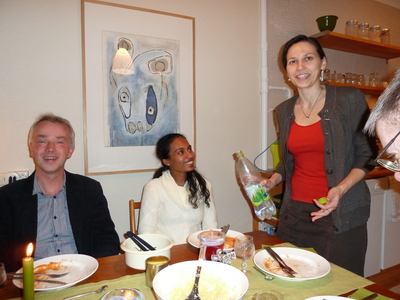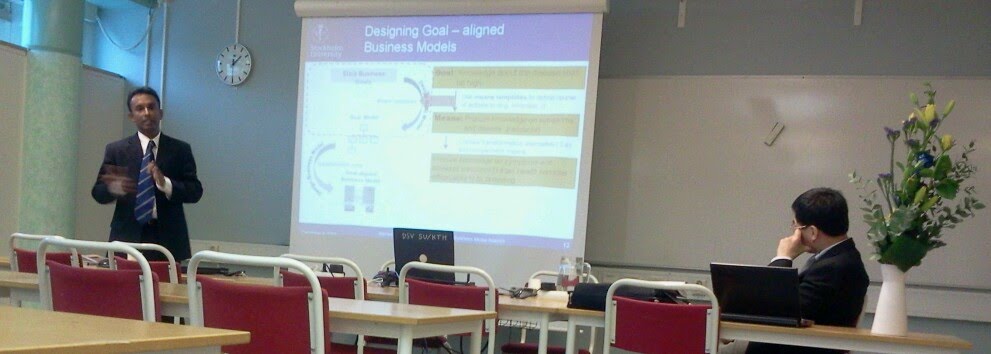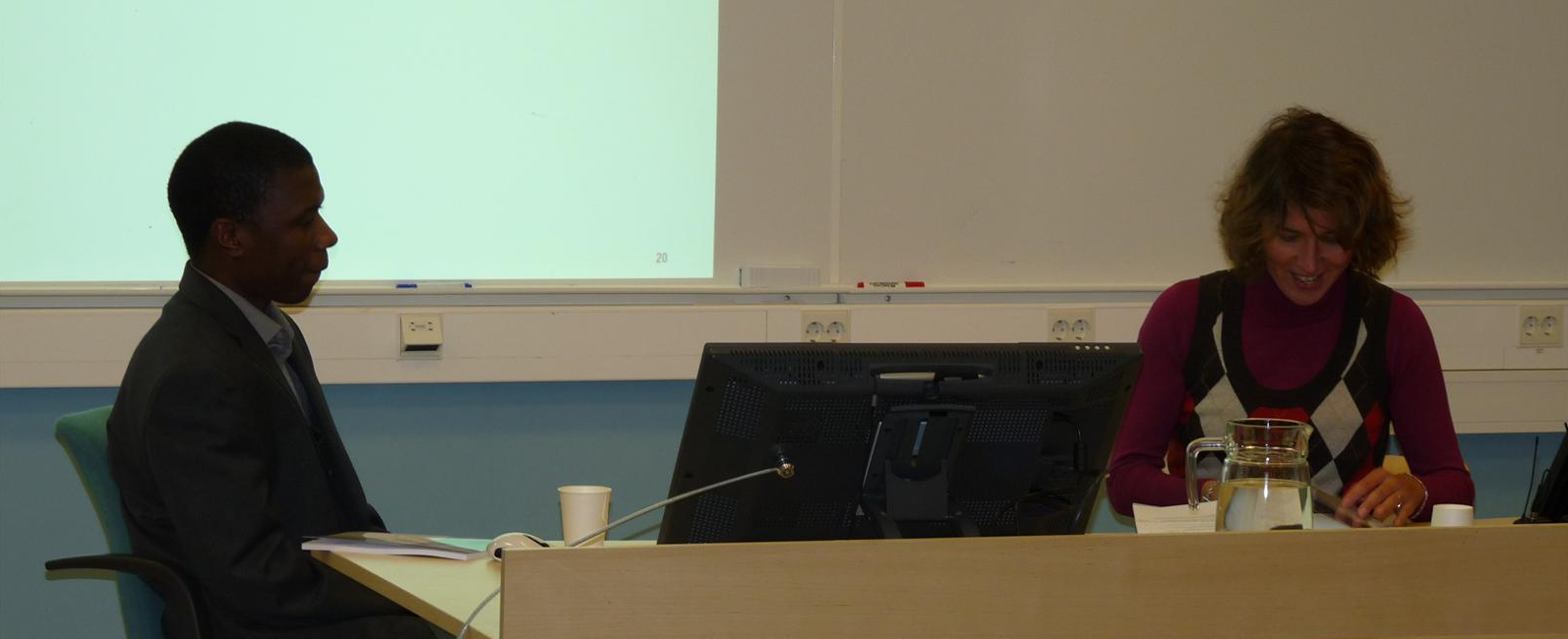Today, Ilia Bider from IbisSoft AB gave a seminar on the current state of BPM based on discussions at the BPM 2010 conference. Ilia outlined a number of trends, including the shift from an assembly line metaphor to that of a construction site. He also discussed the tension between agility and stability in BPM and called for a stronger theoretical foundation of BPM.
Tharaka Ilayperuma PhD Dissertation
Today, Tharaka Ilayperuma defended his PhD thesis “Improving E-Business Design through Business Model Analysis”. The opponent was William Song from Durham University, and the examination committee consisted of Marianne Nilsson from Stockholm University, Eva Söderström from Högskolan Skövde and Henrik Hansson from DSV. Paul Johannesson and Jelena Zdravkovic have been supervisors.
William gave a very thorough opposition including more general as well as very specific questions, ranging from the meaning of e-business to the role of the Semantic Web in business models.
Abstract
To a rapidly increasing degree, traditional organizational structures evolve in large parts of the world towards online business using modern Information and Communication Technology (ICT) capabilities. For efficient applications of inter-organizational information systems, the alignment between business and ICT is a key factor. In this context, business analysis using business modelling can be regarded as a first step in designing economically sustainable e-business solutions.
This thesis examines how business modeling can be used to improve e-business design. We examine how business stakeholder intentions and different objectives of business collaborations can be used to obtain an explorative business model that can be used as a basis for designing e-business solutions. The thesis proposes a set of artifacts for business modeling and e-service design. In regard to business modeling, we propose methods that consider internal aspects such as strategic intentions of actors and external aspects such as business collaborations among them. Considering stakeholder intentions, we introduce a method to design business models based on goal models. A set of templates for designing goal models and a set of transformation rules to obtain business models based on goal models are proposed. To further improve business models considering business collaborations, we suggest a classification of business transactions that considers underlying business objectives of business collaborations. Utilizing the suggested business transactions, we then propose a method to improve business modeling. Finally, we propose a method for designing e-services using business models. The methods suggested support business modelers as well as process and services designers in executing their tasks effectively. The methods have been assessed through applications in two cases.
Towards a process oriented public administration
Today, Gustaf and I gave a Syslab presentation of our paper at Sundsvall 42 this year. The paper discusses the results from the Vinnova project Open Social Services which we are involved in. The goal of the project is the development three e-services for Järfälla municipality. The first e-service, the application for emergency phone for elderly and handicapped people, is currently under testing. We contributed with the process analysis and requirements specification of the service. As part of the work we developed a prototype in the open source workflow management system YAWL.
The prototype and information about it is openly available.
Mturi Elias Licentiate
A Universal Business Process Model Repository. Mturi Elias presented his licentiate on business process model repositories. The photo shows Mturi and Jelena Zdravkovic who was the opponent. Louise Yngström was the examiner, and Paul Johannesson the supervisor.
Abstract
Business Process Management (BPM) has become one of the most important instruments to help modern organizations meet their business goals and achieve competitive advantage. Business process modelling plays a vital role in BPM. Business process modelling is a complex, time-consuming and error-prone task. However, the efforts made to model business processes are seldom reused beyond their original purpose. Rather than modelling business processes from scratch, analysts can derive process models by redesigning existing ones. Business process model repositories provide a central location for storing and managing process knowledge for future reuse.
This thesis starts with the observation that the existing process model repositories for supporting process model reuse suffer from several shortcomings that affect their usability in practice. Firstly, most existing process model repositories are proprietary — they are not publicly open. Therefore, they can only be enhanced or extended with new models by the owners of the repositories. Secondly, it is difficult to search and navigate across repositories because they follow different business and process classification schemes. Thirdly, process models are not goal related, therefore making it difficult to gain an understanding of the business goals that are realized by a certain model. Finally, some repositories have limited scope, meaning that they are domain specific.
Following a design science research method, this thesis addresses the above shortcomings by proposing a universal process model repository to store and manage process knowledge for future reuse. The proposed repository is grounded on three original and interrelated contributions: (1) a set of requirements that a process model repository should possess to increase the probability of process model reuse; (2) a business process metadata model for annotating process models to facilitate searching for process models, navigating the repository and understanding the process models; (3) a generic data model with a common process description format (language independent) for capturing and storing process models from different modelling notations. While the main objective of the research is to provide a design for a unified process model repository that is language independent and open to the public community, the above-mentioned contributions are the results of the work carried out towards the final results.
A Paper on MDA-based Transformations of Services
At the EDOC Enterprise Computing conference (IEEE EDOC 2010), I presented a paper that proposed the elicitation of Web services, using a MDA-aligned model. In particular, we considered business value models and an established collaboration framework for creating a service-centric CIM; by utilizing well-defined mappings, the model is further transformed into a standardized UML-based e-service model at the PIM level.
The full title:
“A Model-Driven Approach for Designing E-Services Using Business Ontological Frameworks”, Jelena Zdravkovic and Tharaka Ilayperuma
Link: http://ieeexplore.ieee.org/xpl/mostRecentIssue.jsp?punumber=5628338
A Service related visit
Syslab had once again the pleasure to welcome Hans Weigand and Jeewanie Jayasinghe Arachchige from Tilburg University for a short visit.

Hans, Jeewanie, Petia and about 2% of Paul at Chez Petia
The main purpose was to work on a particular kind of service which we tentatively call management service. A mangement service is a service that, in some sense, govern some other service. This work is well in line with previous work in the area of Service science that we have done together.
UPDATE: the work resulted in a paper that was accepted for presentation at the 23rd International Conference on Advanced Information Systems Engineering (CAiSE’11)
mHealth Summit 2010
Earlier this month, a conference on mHealth was held in Washington DC (Nov 8-10). Policy makers, company representatives, technical people, health professionals and people from the academia came together for presentations, expert panels, networking and sharing of experiences. Different mHealth services and products were introduced, and trends in mobility and mobile applications were discussed.

CIKM ’10 and 3rd ESAIR
October 27th-30th, I attended the 19th ACM Conference on Information and Knowledge Management (CIKM ’10), and the Third Workshop on Exploiting Semantic Annotations in Information Retrieval (ESAIR 2010), in Toronto, Canada. The CIKM ’10 conference had over 600 participants from all over the world, with tracks covering the topic areas Information Retrieval, Knowledge Management and Databases. The ESAIR workshop consisted of 17 position papers presented as posters, a one-minute boaster session and break-out-groups with discussions. I presented the position paper Semantic Annotations in Clinical Documentation — Exploring Potentials for Future Information Retrieval at ESAIR. The poster can be viewed either in the corridor in front of my office at DSV, or here: http://www.sics.se/jussi/esair2010/poster/APP-Velupillai.pdf. The position paper is available at the ACM Digital Library: http://portal.acm.org/citation.cfm?doid=1871962.1871968.


